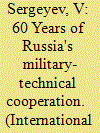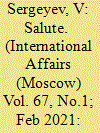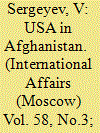|
|
|
Sort Order |
|
|
|
Items / Page
|
|
|
|
|
|
|
| Srl | Item |
| 1 |
ID:
127487


|
|
|
|
|
| Publication |
2013.
|
| Summary/Abstract |
THE SOVIET Chief Engineering Directorate (GIU, now FSVTS - the Russian Federal Service for Military-Technical Cooperation) was established in accordance with the USSR Council of Ministers Resolution No. 6749 of May 8, 1953. Colonel-General G.S. Sidorovich became the first chief of the GIU with a staff of 238 (160 army officers and 78 civilian employees), his deputies being Engineer Colonel M.A. Sergeychik and Rear Admiral G.V. Yurin.1
Of course, Soviet cooperation with foreign countries in the military-technical sphere had begun long before that, although perhaps it was from this time that it began to directly influence the foreign policy of our country.
|
|
|
|
|
|
|
|
|
|
|
|
|
|
|
|
| 2 |
ID:
180720


|
|
|
|
|
| Summary/Abstract |
I SPENT much of my childhood in Ukraine. The son of an army officer, I moved from garrison to garrison due to my father's promotions. Each time, I had to adjust to a new group of children, and that wasn't always a smooth process. It was one thing if you were put in, say, a fifth-grade class that consisted of boys and girls of the same age from the entire garrison. Everyone would be glad a new kid had joined the class and friendships were normally quick to develop. But what was happening outside school was a different story: kids of all ages would come together in outdoor spaces and form a group with its own established rules and leaders. That was a milieu you needed some effort to adjust to. You had to go through various trials to win the right to be accepted by the gang as one of their own. But if you were accepted as such, you were one hundred percent safe. The gang would never have betrayed you and would always have protected and taken care of you.
|
|
|
|
|
|
|
|
|
|
|
|
|
|
|
|
| 3 |
ID:
114462


|
|
|
|
|
| Publication |
2012.
|
| Summary/Abstract |
LAST SPRING, U.S. President Barack Obama definitively decided to withdraw American troops from Afghanistan. According to his plan, out of the 102,000 servicemen currently stationed in Afghanistan, only 20,000-30,000 will remain in the country by late 2014 in order to carry out support and supply functions.1 Over 40,000 servicemen from Great Britain, Canada, Australia, and other U.S. allies will, most likely, be withdrawn entirely. Between 2010 and the first half of 2011, there were almost 150,000 soldiers from over 40 states in Afghanistan, yet this number did not suffice for victory. According to a study by the British Parliament, the Afghan central government and the troops of the international coalition control only a third of the country.2
|
|
|
|
|
|
|
|
|
|
|
|
|
|
|
|
|
|
|
|
|